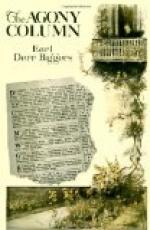It is of myself that I must write, I know. I will not, then, tell you what is in my mind—the picture of you I carry. It would mean little to you. Many Texan gallants, no doubt, have told you the same while the moon was bright above you and the breeze was softly whispering through the branches of—the branches of the—of the—
Confound it, I don’t know! I have never been in Texas. It is a vice in me I hope soon to correct. All day I intended to look up Texas in the encyclopedia. But all day I have dwelt in the clouds. And there are no reference books in the clouds.
Now I am down to earth in my quiet study. Pens, ink and paper are before me. I must prove myself a person worth knowing.
From his rooms, they say, you can tell much about a man. But, alas! these peaceful rooms in Adelphi Terrace—I shall not tell the number—were sublet furnished. So if you could see me now you would be judging me by the possessions left behind by one Anthony Bartholomew. There is much dust on them. Judge neither Anthony nor me by that. Judge rather Walters, the caretaker, who lives in the basement with his gray-haired wife. Walters was a gardener once, and his whole life is wrapped up in the courtyard on which my balcony looks down. There he spends his time, while up above the dust gathers in the corners—
Does this picture distress you, my lady? You should see the courtyard! You would not blame Walters then. It is a sample of Paradise left at our door—that courtyard. As English as a hedge, as neat, as beautiful. London is a roar somewhere beyond; between our court and the great city is a magic gate, forever closed. It was the court that led me to take these rooms.
And, since you are one who loves mystery, I am going to relate to you the odd chain of circumstances that brought me here.
For the first link in that chain we must go back to Interlaken. Have you been there yet? A quiet little town, lying beautiful between two shimmering lakes, with the great Jungfrau itself for scenery. From the dining-room of one lucky hotel you may look up at dinner and watch the old-rose afterglow light the snow-capped mountain. You would not say then of strawberries: “I hate them.” Or of anything else in all the world.
A month ago I was in Interlaken. One evening after dinner I strolled along the main street, where all the hotels and shops are drawn up at attention before the lovely mountain. In front of one of the shops I saw a collection of walking sticks and, since I needed one for climbing, I paused to look them over. I had been at this only a moment when a young Englishman stepped up and also began examining the sticks.
I had made a selection from the lot and was turning away to find the shopkeeper, when the Englishman spoke. He was lean, distinguished-looking, though quite young, and had that well-tubbed appearance which I am convinced is the great factor that has enabled the English to assert their authority over colonies like Egypt and India, where men are not so thoroughly bathed.




